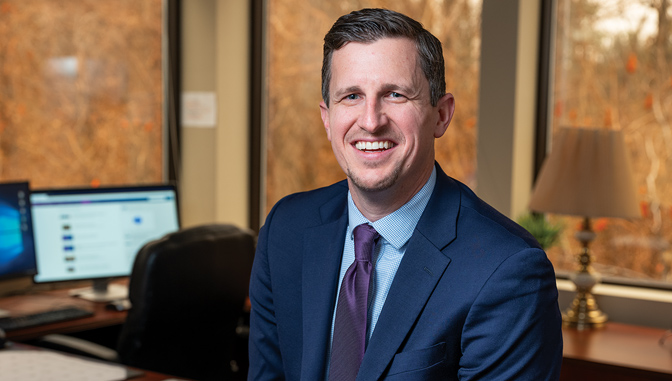Q&A with Scott Dolan

How is graduate education changing?
It is pretty clear to me that the demand for graduate education is increasing, and I expect that to continue into the future. Data shows that a graduate education is a real differentiator. Only about 10 percent of people in the United States under the age of 29 have a master’s degree or higher, while nearly 20 percent of all jobs posted over the past year require a graduate or professional degree. This means a graduate degree is a distinction with great potential value and can unlock opportunities to well-paying careers.
How is Excelsior responding to challenges in graduate education?
First and foremost, we are developing our academic programs to meet the needs of our students and the mission of the College. We are focusing on increasing the access to and affordability of a graduate education. This means we need to continue to price our graduate programs competitively. This will allow us to serve our diverse student population, prepare them to be leaders in their field, and unlock opportunities to great careers. Education remains one of the key drivers of economic mobility, and in a society with increasing economic inequality, we are striving to be part of the solution.
Second, we are focusing on our strengths, which is meeting students where they are by leveraging our fully online delivery model. This gives us a significant competitive advantage over other institutions, which are often averse or wary of online education despite the increasing demand for it.
Third, we are committed to being agile and innovative. We know we need to invest more fully in different types of educational offerings, including certificates, badges, and non-credit offerings. We will be developing smaller “chunks” of learning to meet the demand of the market and our students, and we will look for ways to stack them into and on top of our full master’s degrees. Building smaller components of learning aligns with our innovative mindset and allows us to be more nimble and take some risks in adapting to emerging markets without assuming all of the costs associated with full program development.
And finally, we will provide students with co- and extracurricular learning opportunities through internships — both virtual and on the ground — and through student and professional associations. Our graduate students are career-oriented and are either looking for skills that can help them advance within their current career or are looking to change their career. Internships provide experiential learning opportunities, where they can take what they have learned in our courses and apply that learning to the context of tasks and jobs in the field. With our student associations, we are trying to build community with students, expose them to emerging trends within the profession, and help them to build their peer networks. From the literature, we know this impacts their success while in the program, but we also think these opportunities expand their professional networks and allow them to develop their professional identity and presence.
Taken as a whole, we are really trying to think of ways to develop programs that mirror the changes in the field itself.
What about the graduate programs sets up students for success in their careers and future endeavors?
Graduate programs are designed to help people assume positions of leadership in their fields. This means we are developing people to take their discipline forward and to operate at the forefront of their field. The problems and issues that we face in the world today simply cannot be solved without an open, agile coordination across sectors and disciplines. The world needs people who are comfortable with complexity, can think broadly, and work collaboratively to seek innovative solutions. And because the nature of work itself is dynamic and changing rapidly, the world needs people who are learning continuously. An advanced education shows a student is willing to adapt with the changes around them and will invest in themselves to be successful into the future.
What skills can a student expect to gain from the graduate experience?
We expect our master’s-level graduates to assume leadership positions, which will require them to communicate with and influence diverse sets of stakeholders, think critically and analytically, and make strategic, evidence-based, and ethically appropriate decisions. We want our students to graduate fully equipped to be highly ethical and effective leaders in their organizations and in their fields. Our work infusing these competencies into our program is really starting with our 6-credit interdisciplinary core but will evolve as we redevelop the curriculum for each of our programs.
You’ve said that graduate school changes a person. How did your graduate school experience change you?
It changed me in some really profound ways. It taught me that there is a community of people who are committed to searching for answers and truth, and that this community of people has mechanisms to hold each other accountable for our perspectives and statements about the world. This is no small statement, especially in a world where fact and truth are often questioned publicly.
It also taught me that searching for answers requires you to be a good critical thinker and analyst. To me, this means that you need to know how to ask good questions, and to learn that there are methods and processes for gathering information that can help you answer questions. It taught me that I also need to understand the limits of my own views, and to be courageous enough to question my own assumptions. Graduate education taught me that my world or personal orbit was small. It opened me up to a universe of new ideas and ways of looking at the world, which really makes me appreciate the diversity of worldviews. And finally, it provided me with a network of colleagues and friends who I still engage with today, albeit in different ways, but it gave me the support of a network of people who I can call on as needed.


